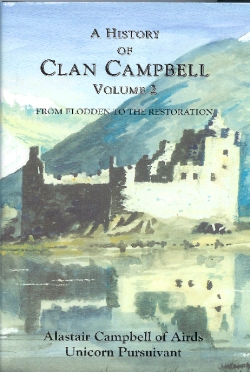|
A History of Clan Campbell, Volume 2
From Flodden to the Restoration
Reviewed by: Frank R. Shaw,
FSA Scot, Atlanta, GA, USA
 Alastair
Campbell of Airds, Unicorn Pursuivant, has done it again! Simply put, he
has made my job of reviewing this book an easy one, a thing of beauty, as
well as a matter of joy. Do not confuse this book with your average,
run-of-the-mill clan history. If you do, you are the loser. This is a
powerful book, riveting and full of "canít wait to get to the next page"
writing by a master at his craft. Alastair
Campbell of Airds, Unicorn Pursuivant, has done it again! Simply put, he
has made my job of reviewing this book an easy one, a thing of beauty, as
well as a matter of joy. Do not confuse this book with your average,
run-of-the-mill clan history. If you do, you are the loser. This is a
powerful book, riveting and full of "canít wait to get to the next page"
writing by a master at his craft.
To know the history of
Scotland is to know the history of its movers and shakers. Yet, "just to
know" is not enough to get the real picture. More importantly, to
understand the history of this proud nation is to be familiar with the
lives of Scotlandís greatest sons - "de Brus", Wallace, Montrose, Bonnie
Prince Charlie - to name just a few of the giants. But many times larger
than these individual warriors are the clans they represented and brought
to the battlefields of Scotland. To know the history of Scotland is to
know the history of its dominant clans.
My daddy would have called
them "the high and mighty". None have been higher or mightier than Clan
Campbell, the clan that many love to hate. And, if you want to have a
better understanding of the history of Scotland, I suggest to one and all
that you buy this book, check it out of a library, or borrow it from a
friend. Yes, to know the history of Scotland is to know the history of
Clan Campbell because "supporting the Crown was a family tradition".
"From Flodden to the
Restoration," Alastair Campbell gives us a "behind the scenes" look at
"the good, the bad, and the ugly" of Clan Campbell. You will find the
author candidly and refreshingly telling of the atrocities committed by
the MacDonalds and the Campbells, two of Scotlandís warring clans. There
is no attempt to whitewash or cover up the many incidents in history of
the utter hatred these clans had for each other and the wanton destruction
committed by each.
The author recounts a
favorite story of mine as it pertains to the Isle of Jura where my
ancestors came from. It is the story of a Shaw who offered to fight for
the Macleans and was rejected in a rude manner by their chief. This
prompted Shaw to move to the other side and fight with the MacDonalds. A
showdown between the Macleans and the MacDonalds took place in Islay in
1598. (Yes, the Campbells and the MacDonalds fought to the death with
other clans, not just each other). "Before the battle was joined, so goes
the story, Lachlan Mor had been approached by Dubh-sidh or Shaw of Jura.
Shaw was a small man and his offer of service was contemptuously rejected
by the Maclean Chief. This did him no good at all since the insulted Shaw
waited until he had his opportunity and shot Lachlan Mor with an arrow in
his chest and killed him. Seeing their leader fall, the Macleans broke and
ran. The survivors took refuge in the Church of Kilnave, overlooking the
broad sands of the bay. But their refuge availed them nothing as the
triumphant MacDonalds set fire to the church and burnt alive all those
sheltering within it." I have often used this story to teach the lesson
for one to be careful who you mock, ridicule, taunt, or make fun of
because your actions could end up biting you in the you know what. This
Shaw was a very small man, but he was big enough to shoot his bow, and the
last laugh was on Lachlan Mor.
This is a book about Clan
Campbell. But do not be lulled to sleep thinking it is one sided in favor
of the Campbells. I believe the author has objectively pointed out the
historical facts, pro and con, of the Campbells and the clans they fought
against. He has adhered to the old saying that a "coin has two sides," and
his book is full of such evidence.
Two appendices appear. One
deals with a rather substantial collection of music associated with Clan
Campbell that Scottish music lovers will find of interest. The other
discusses the Clan symbolic emblems, and the one that spoke to me most was
the reference to the place where the clan rallied. It will bring to the
readerís mind the place where his or her individual clan met before going
off to battle. Right now, I can picture in my mind Clan Shaw joining with
its fellow members of Clan Chattan at the auld Dunlichity kirk, where I
have stood many times taking the same pictures on each trip. They met to
sharpen their weapons on the corner of the stone church where one will
find today a sword-worn indentation that is centuriesí old. Some things
you just never forget, and this is a book that falls in the same category!
(3/9/03) See also
A Chat with Alastair Campbell of Airds |

